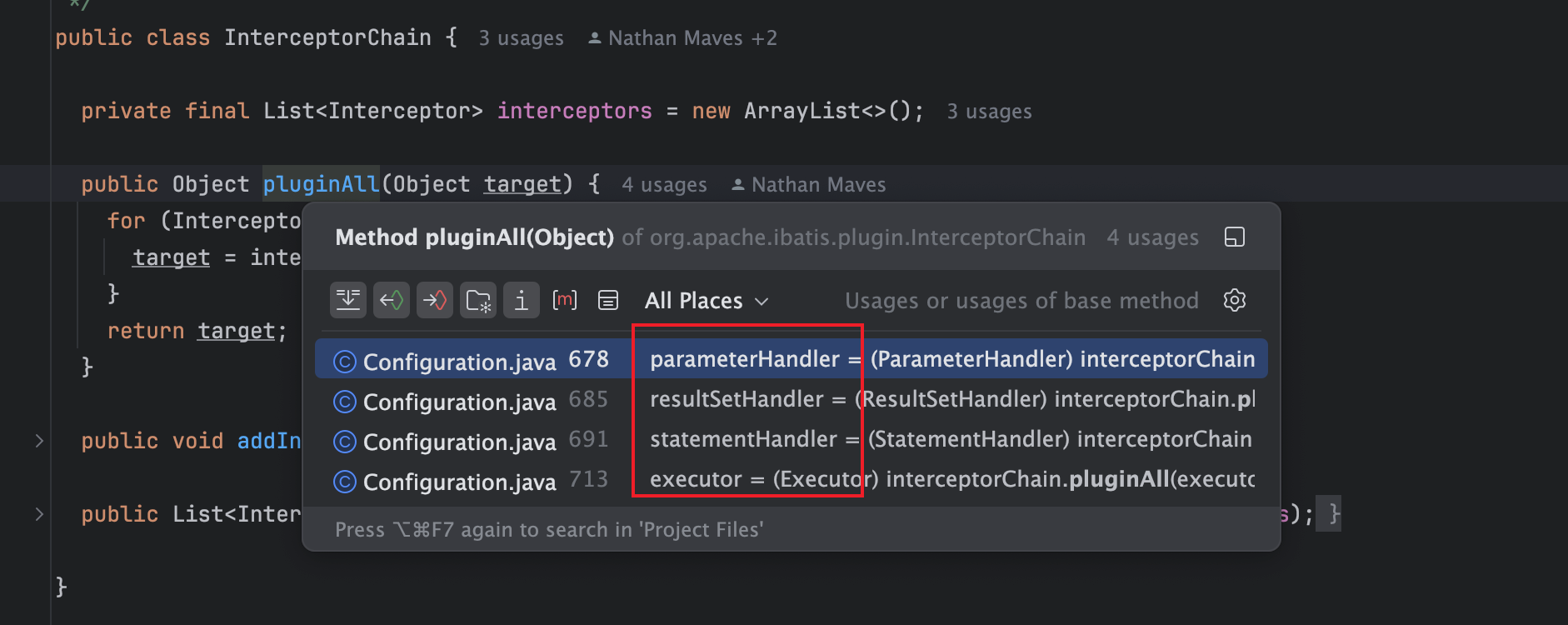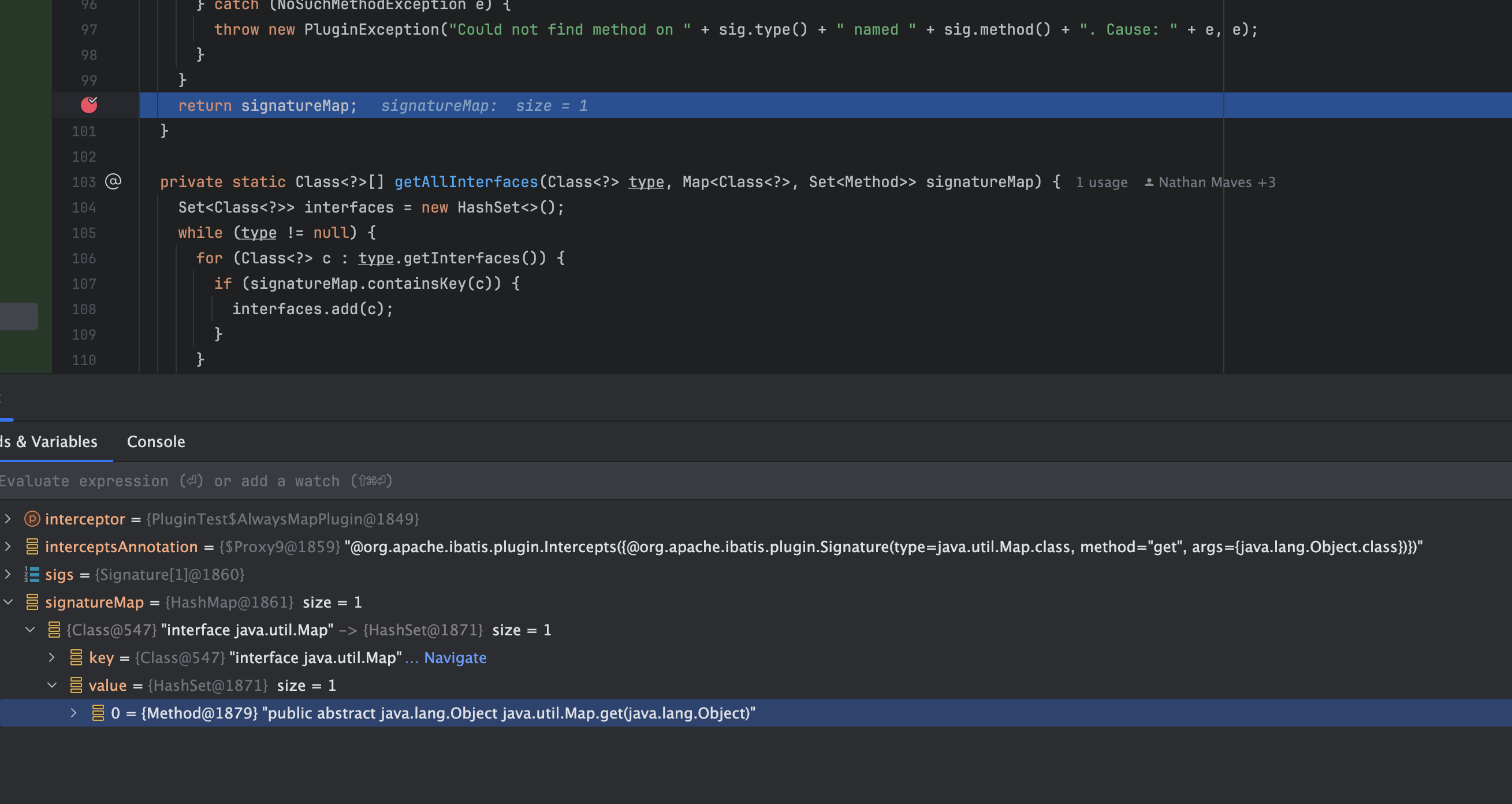MyBatis-插件模块
约 849 字大约 3 分钟
MyBatis-插件模块
- 插件模块实际上还是基于Java的jdk代理实现,提供第三方扩展mybatis使用
- 通常我们使用mybatis的插件模块来扩展sql日志的打印,重写sql,分页插件等
模块详情

静态属性
private final List<Interceptor> interceptors = new ArrayList<>();
- 拦截器数组集合
类Interceptor
public interface Interceptor {
// 拦截方法
Object intercept(Invocation invocation) throws Throwable;
/**
* 应用插件
* @param target 目标对象
* @return
*/
default Object plugin(Object target) {
return Plugin.wrap(target, this);
}
// 设置拦截器属性
default void setProperties(Properties properties) {
// NOP
}
类InterceptorChain
pluginAll方法
- 应用所有拦截器到指定对象
public Object pluginAll(Object target) {
for (Interceptor interceptor : interceptors) {
target = interceptor.plugin(target);
}
return target;
}
- 这个方法被四个目标对象使用,一共可以有四种目标对象类型可以被拦截:1)Executor;2)StatementHandler;3)ParameterHandler;4)ResultSetHandler

- 方法interceptor.plugin(target);在org.apache.ibatis.plugin.Interceptor被实现,
/**
* 应用插件
* @param target 目标对象
* @return
*/
default Object plugin(Object target) {
return Plugin.wrap(target, this);
}
public static Object wrap(Object target, Interceptor interceptor) {
// 1、获取拦截器所有的签名集合
Map<Class<?>, Set<Method>> signatureMap = getSignatureMap(interceptor);
// 2、获取目标对象所属类
Class<?> type = target.getClass();
// 3、获取所有接口
Class<?>[] interfaces = getAllInterfaces(type, signatureMap);
// 3、1 如果有接口的话:
if (interfaces.length > 0) {
// 创建目标对象的jdk proxy 对象
return Proxy.newProxyInstance(
type.getClassLoader(),
interfaces,
new Plugin(target, interceptor, signatureMap));
}
//3、2 没有则返回原始类
return target;
}
方法getSignatureMap
private static Map<Class<?>, Set<Method>> getSignatureMap(Interceptor interceptor) {
// 基于注解Intercepts和Signature获取内容
// 获取目标类上的Intercepts注解对象
Intercepts interceptsAnnotation = interceptor.getClass().getAnnotation(Intercepts.class);
// issue #251
if (interceptsAnnotation == null) {
throw new PluginException("No @Intercepts annotation was found in interceptor " + interceptor.getClass().getName());
}
// 获取注解当中的Signature注解集合
Signature[] sigs = interceptsAnnotation.value();
Map<Class<?>, Set<Method>> signatureMap = new HashMap<>();
for (Signature sig : sigs) {
Set<Method> methods = MapUtil.computeIfAbsent(signatureMap, sig.type(), k -> new HashSet<>());
try {
// 获取Signature注解当中配置的Method方法
Method method = sig.type().getMethod(sig.method(), sig.args());
methods.add(method);
} catch (NoSuchMethodException e) {
throw new PluginException("Could not find method on " + sig.type() + " named " + sig.method() + ". Cause: " + e, e);
}
}
return signatureMap;
}
具体的Intercepts和Signature形式参考插件模块的测试类,如下所示:
@Intercepts({
@Signature(type = Map.class, method = "get", args = {Object.class})})
public static class AlwaysMapPlugin implements Interceptor {
@Override
public Object intercept(Invocation invocation) {
return "Always";
}
}
方法getSignatureMap获取的结果是:

类Invocation
构造方法
public class Invocation {
// 目标对象
private final Object target;
// 目标对象的方法
private final Method method;
// 目标对象所有参数
private final Object[] args;
public Invocation(Object target, Method method, Object[] args) {
this.target = target;
this.method = method;
this.args = args;
}
类Plugin
构造方法
public class Plugin implements InvocationHandler {
// 实际
private final Object target;
private final Interceptor interceptor;
// 插件的签名集合
private final Map<Class<?>, Set<Method>> signatureMap;
private Plugin(Object target, Interceptor interceptor, Map<Class<?>, Set<Method>> signatureMap) {
this.target = target;
this.interceptor = interceptor;
this.signatureMap = signatureMap;
}
方法wrap
public static Object wrap(Object target, Interceptor interceptor) {
// 1、获取拦截器所有的签名集合
Map<Class<?>, Set<Method>> signatureMap = getSignatureMap(interceptor);
// 2、获取目标对象所属类
Class<?> type = target.getClass();
// 3、获取所有接口
Class<?>[] interfaces = getAllInterfaces(type, signatureMap);
// 3、1 如果有接口的话:
if (interfaces.length > 0) {
// 创建目标对象的jdk proxy 对象
return Proxy.newProxyInstance(
type.getClassLoader(),
interfaces,
new Plugin(target, interceptor, signatureMap));
}
//3、2 没有则返回原始类
return target;
}
创建目标类的代理对象
首先获取拦截器上的集合,参考方法getSignatureMap
然后获取目前对象的所有接口getAllInterfaces
private static Class<?>[] getAllInterfaces(Class<?> type, Map<Class<?>, Set<Method>> signatureMap) {
Set<Class<?>> interfaces = new HashSet<>();
while (type != null) {
for (Class<?> c : type.getInterfaces()) {
if (signatureMap.containsKey(c)) {
interfaces.add(c);
}
}
type = type.getSuperclass();
}
return interfaces.toArray(new Class<?>[0]);
}
Powered by Waline v3.1.3
